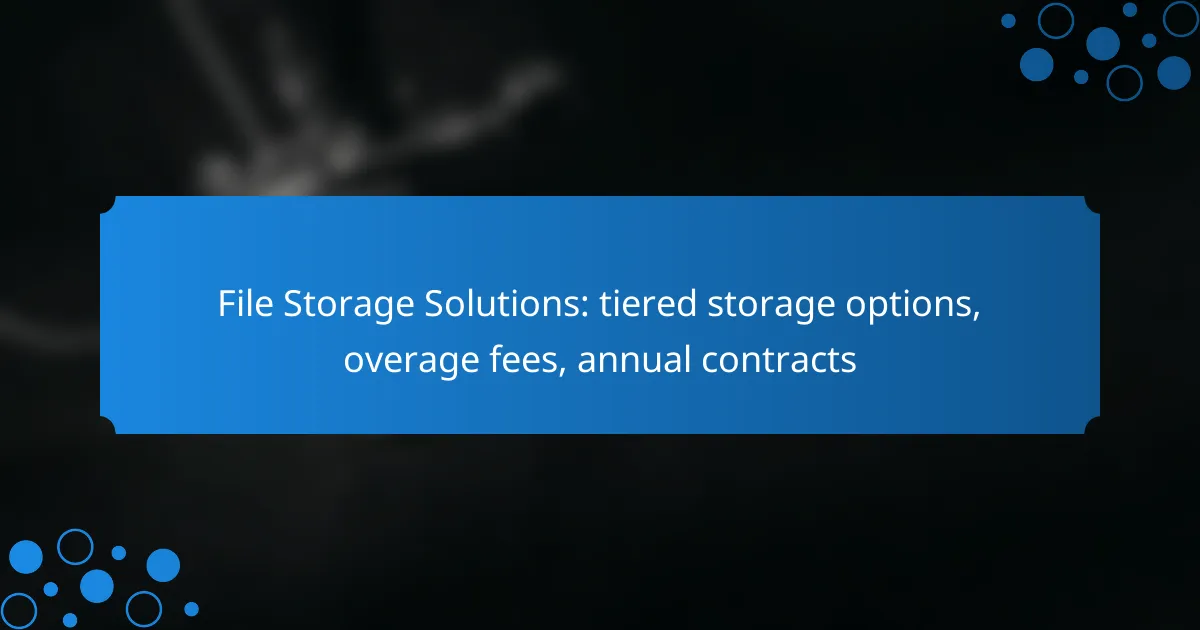When selecting a file storage solution, it’s essential to consider tiered storage options, overage fees, and contract terms. Tiered storage allows users to optimize costs by categorizing data based on access frequency, while overage fees can significantly affect budgeting if storage limits are exceeded. Understanding these elements will help you choose a service that aligns with your needs and financial constraints.
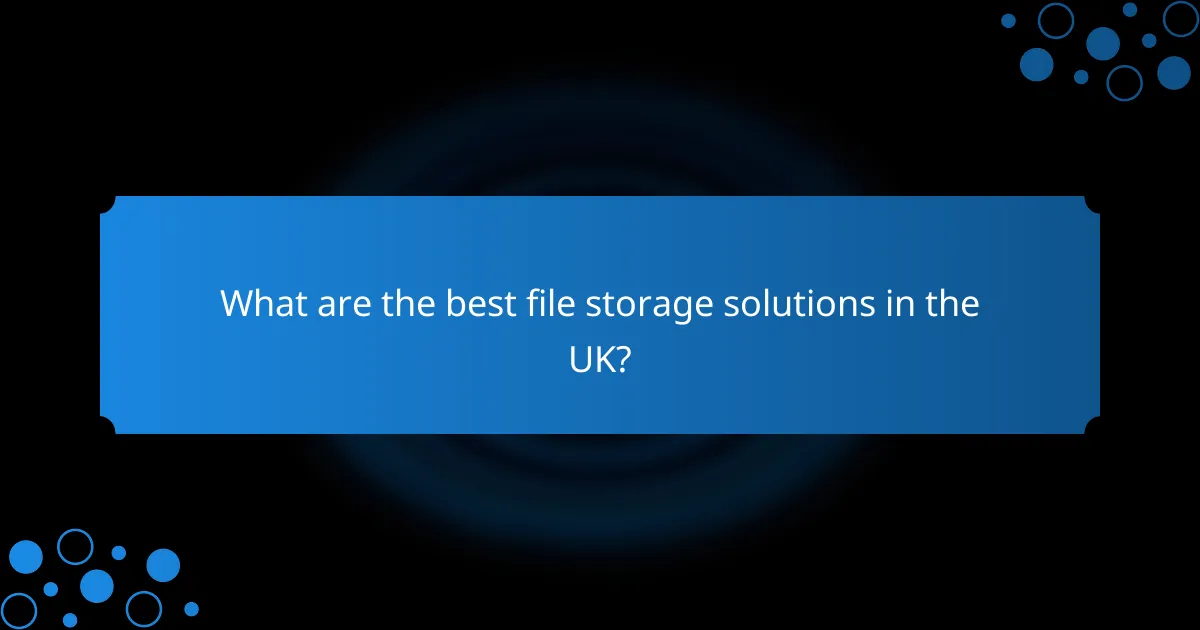
What are the best file storage solutions in the UK?
The best file storage solutions in the UK offer a mix of tiered storage options, flexible pricing, and user-friendly features. Popular choices include Google Drive, Dropbox, Microsoft OneDrive, Box, and pCloud, each catering to different storage needs and budgets.
Google Drive
Google Drive is a widely used cloud storage service that integrates seamlessly with other Google Workspace applications. It offers 15 GB of free storage, which can be expanded through various paid plans, making it suitable for both personal and business use.
Consider the tiered storage options available, which range from 100 GB to several terabytes. Google Drive also has a straightforward pricing structure, with monthly and annual contracts available, allowing users to choose what best fits their needs.
Dropbox
Dropbox is known for its simplicity and collaboration features, making it a favorite among teams. The basic plan provides 2 GB of free storage, with paid plans offering up to 3 TB of space.
When evaluating Dropbox, keep in mind the overage fees that may apply if you exceed your storage limit. Annual contracts can offer savings compared to monthly payments, so consider your long-term storage needs before committing.
Microsoft OneDrive
Microsoft OneDrive is integrated with Microsoft 365, making it an excellent choice for users already within the Microsoft ecosystem. It offers 5 GB of free storage, with paid plans that can go up to 6 TB for business users.
OneDrive’s tiered storage options are beneficial for scaling as your storage needs grow. Be aware of the annual contract options that can provide cost savings, especially for businesses that require more extensive storage solutions.
Box
Box is tailored for businesses and enterprises, focusing on security and collaboration. It offers 10 GB of free storage, with paid plans that provide unlimited storage for larger teams.
When considering Box, evaluate the tiered storage options and the features included in each plan, such as advanced security and compliance tools. Annual contracts may offer better rates, especially for organizations needing extensive file storage and sharing capabilities.
pCloud
pCloud is a versatile cloud storage solution that offers a unique lifetime purchase option, allowing users to pay once for permanent storage. The free plan provides 10 GB, with paid plans offering up to 2 TB.
pCloud’s tiered storage options are flexible, and its pricing structure is competitive, especially for those looking for long-term solutions. Be mindful of the overage fees that can apply if you exceed your storage limits, and consider the annual plans for potential savings.
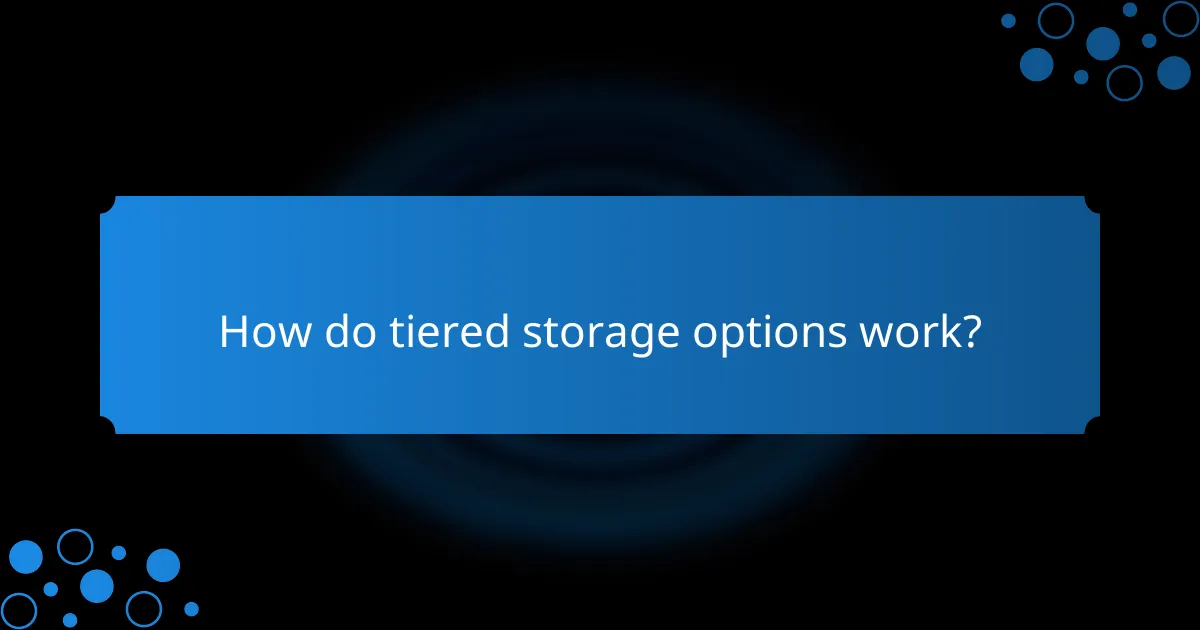
How do tiered storage options work?
Tiered storage options categorize data based on access frequency and performance needs, allowing organizations to optimize costs and efficiency. By allocating data to different storage types—such as hot, cold, and archive—businesses can manage their resources effectively while ensuring that critical information is readily available.
Hot storage
Hot storage is designed for data that requires immediate access and high performance. This type of storage typically utilizes solid-state drives (SSDs) or high-speed hard drives to facilitate quick retrieval times, making it ideal for active databases and applications.
When considering hot storage, be mindful of costs, as it tends to be the most expensive option. Organizations should evaluate their data access patterns to ensure they are not over-provisioning hot storage for less frequently accessed data.
Cold storage
Cold storage is suitable for data that is infrequently accessed but still needs to be retained for compliance or future use. This storage type often employs slower hard drives or tape systems, which significantly reduce costs compared to hot storage.
While cold storage is economical, retrieval times can be longer, ranging from minutes to hours. Businesses should assess their data retention policies to determine which data can be moved to cold storage without impacting operations.
Archive storage
Archive storage is intended for data that is rarely accessed and is kept primarily for long-term retention. This type of storage is often the most cost-effective, using tape or cloud solutions that prioritize durability over speed.
When implementing archive storage, consider regulatory requirements for data retention and retrieval. Ensure that the archived data is organized and indexed properly to facilitate future access when needed, as retrieval can take longer than cold storage.
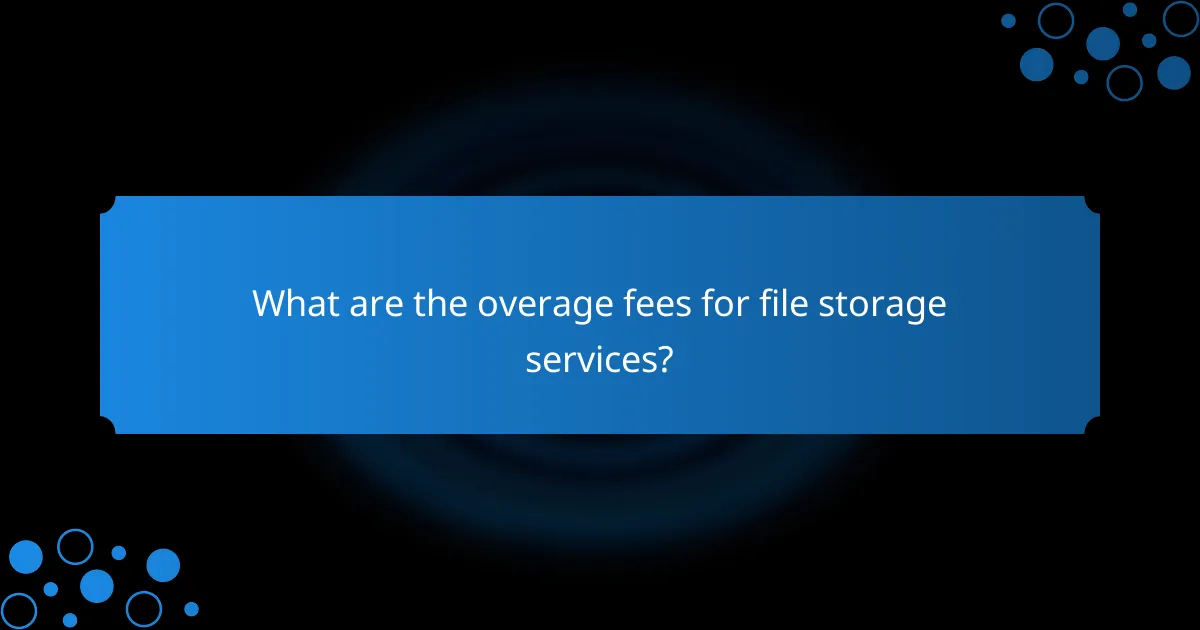
What are the overage fees for file storage services?
Overage fees for file storage services are charges incurred when users exceed their allocated storage limits. These fees can vary significantly between providers, often impacting overall costs and budgeting for businesses and individuals.
Google Drive overage fees
Google Drive charges users for additional storage beyond their plan limits. If you exceed your storage capacity, you may incur fees that typically range from a few dollars to around $30 per month for additional gigabytes, depending on the amount needed.
It’s essential to monitor your usage regularly to avoid unexpected charges. Google offers a tiered pricing structure, so consider upgrading your plan if you consistently exceed your limit.
Dropbox overage fees
Dropbox’s overage fees apply when users surpass their storage limits on certain plans. For individual users, this can lead to charges of approximately $10 per additional 100 GB per month, while business plans may have different structures based on team usage.
To manage costs effectively, evaluate your storage needs and consider upgrading to a higher-tier plan if you frequently encounter overage situations. Regularly reviewing shared files can also help minimize unnecessary storage use.
Microsoft OneDrive overage fees
Microsoft OneDrive imposes overage fees when users exceed their storage allowance. Fees can range from around $2 to $10 per month for additional storage, depending on the amount you need beyond your plan.
To avoid these fees, keep an eye on your storage usage through the OneDrive interface. If you find yourself consistently needing more space, upgrading your plan may be a more cost-effective solution in the long run.
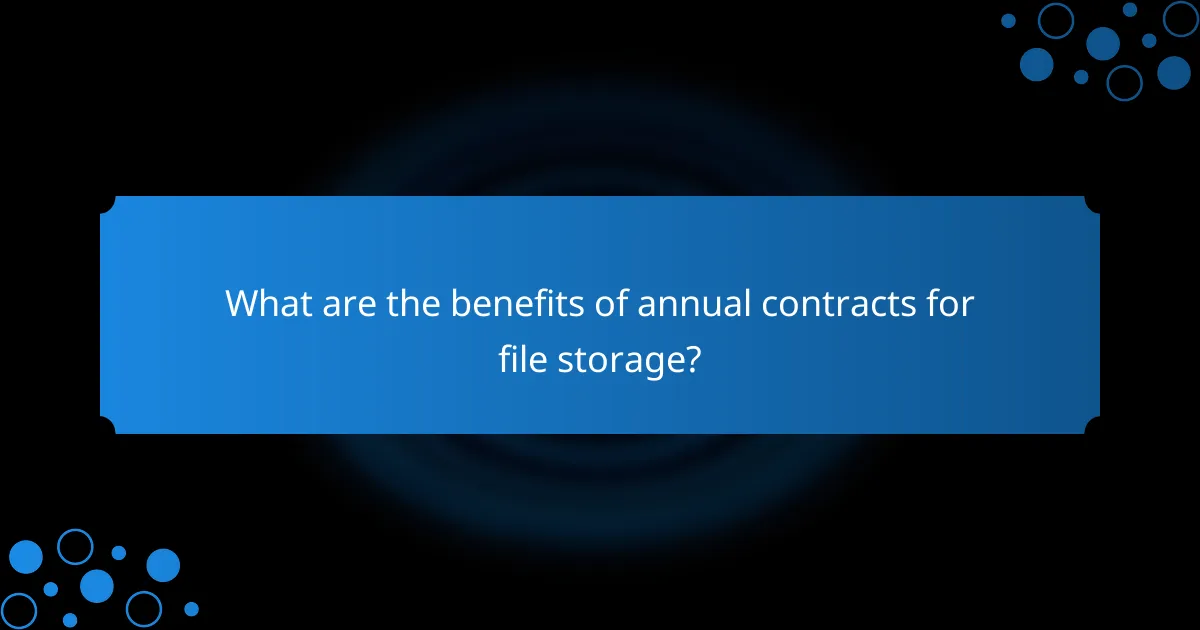
What are the benefits of annual contracts for file storage?
Annual contracts for file storage offer significant advantages, including predictable budgeting and potential discounts. By committing to a longer-term agreement, businesses can often secure lower rates and enhanced service features.
Cost savings
One of the primary benefits of annual contracts is cost savings. Many providers offer discounts for customers who commit to a full year, which can lead to savings of 10-30% compared to month-to-month pricing. This is particularly advantageous for businesses with stable storage needs.
Additionally, annual contracts can help avoid unexpected overage fees that may arise from fluctuating storage usage. By locking in a rate, companies can better manage their budgets and allocate resources more effectively.
Increased storage limits
Annual contracts often come with increased storage limits compared to monthly plans. Providers may offer tiered storage options that allow businesses to scale their storage capacity without incurring additional fees. This flexibility is crucial for organizations anticipating growth or seasonal spikes in data storage needs.
Moreover, some providers include additional features, such as enhanced security measures or faster access speeds, as part of annual agreements. This can further justify the investment, making it a practical choice for companies looking to optimize their file storage solutions.
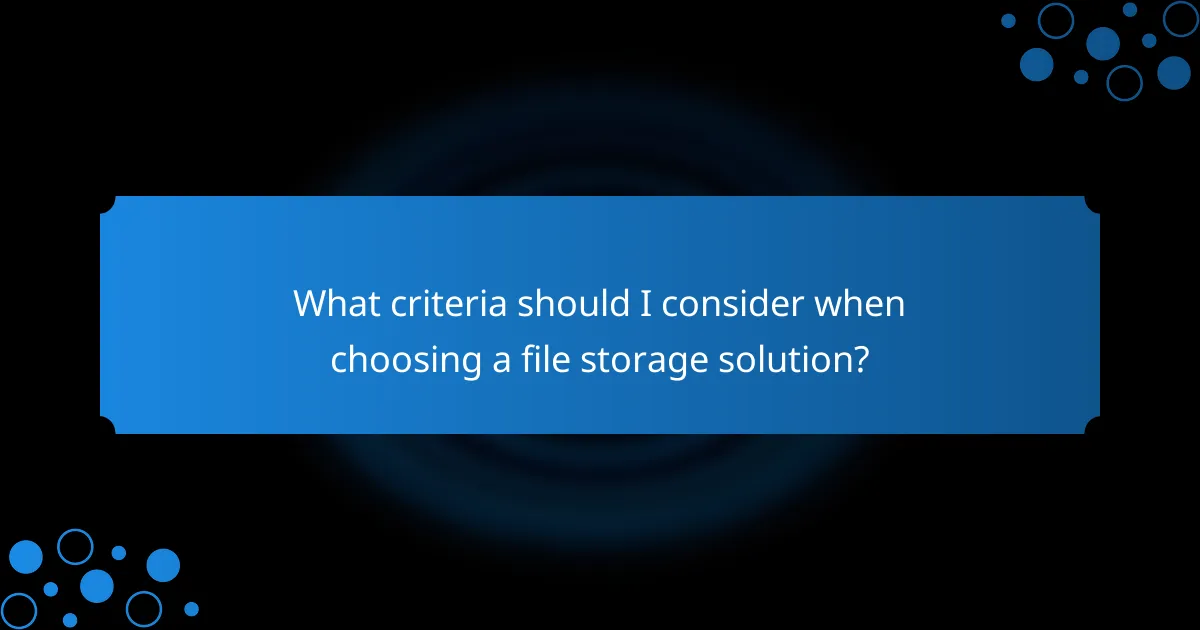
What criteria should I consider when choosing a file storage solution?
When selecting a file storage solution, consider factors such as scalability, overage fees, and contract terms. These elements will significantly impact your storage capacity, costs, and flexibility in adapting to changing needs.
Scalability
Scalability refers to the ability of a storage solution to grow with your needs. A scalable system allows you to increase storage capacity without significant disruptions or costs. Look for options that offer tiered storage, enabling you to adjust your plan based on current requirements.
When evaluating scalability, consider both vertical and horizontal scaling. Vertical scaling involves upgrading existing storage, while horizontal scaling adds more storage units. A combination of both can provide a robust solution that adapts to fluctuating demands.
For example, if your business anticipates growth, choose a provider that allows for easy upgrades and has flexible pricing structures. Avoid solutions with rigid contracts that may lock you into a specific capacity, leading to unnecessary overage fees if your needs change.
